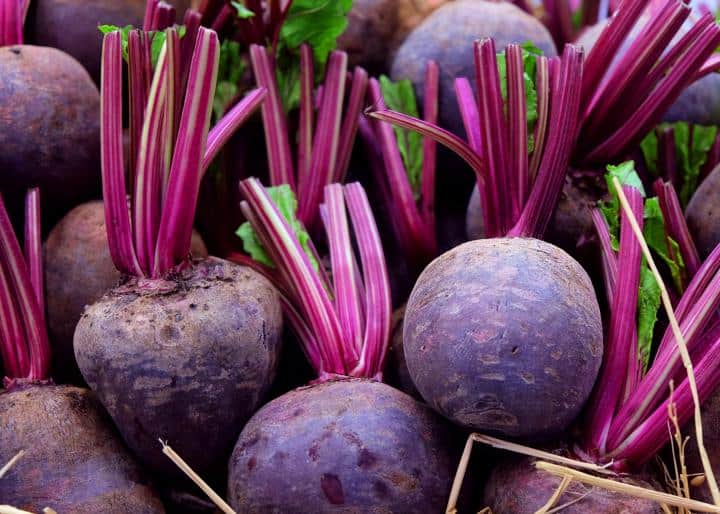About Beets – A Treasure Trove of Health Benefits

The beet, which is actually a nutritious, wholesome root, is part of the chenopod family. This class of vegetables includes spinach, quinoa, and chard, and has been in the limelight for quite some time due to its ever-increasing and exclusive health benefits.
Beets are sweet, hard and crunchy when raw, but cook them and they turn into soft, buttery vegetables that can be consumed in myriad ways. Raw beets are just as popular as cooked beets or pickled beets. Read further to benefit from the quick and easy serving tips provided by Online Scoops!
This superb vegetable is available in a wide array of colors including white, yellow-golden, and the popular inky reddish-purple hue. The beet may look like a sturdy vegetable, but even the slightest bruise can cause the red-purple pigment to seep out of the root.
The pigments that give the beet its rich color, (phytonutrients including betalains and anthocyanins), are temperature sensitive and water-soluble. Hence, this seemingly firm vegetable needs to be handled with care so that it does not get damaged.
Table of Contents
Beets- Nutritional Information
Beets contain a precious goldmine of priceless nutrients. One cup of raw beets, about 136 grams, contains an impressive 37% of folate. Beets also contain generous quantities of important minerals such as manganese (22.5%), potassium (12.6%), magnesium (7.8%), iron (6%), phosphorous (5.4%) and copper (5%). All these minerals contribute to making your body healthy and fit.
Beets are also a rich source of dietary fiber and vitamin C. One cup of this delicious vegetable contains a whopping 15.2% of fiber and 11.1% of Vitamin C. And we saved the best for last; all these wholesome nutrients are worth only 58 calories! Sounds like a sweet deal, doesn’t it?
Health Benefits
Lets’ take a look at what all these vitamins and minerals can do for your body:
Excellent for Maintaining Optimal Health!
Beets contain betalains, pigments that give the vegetable its attractive color. These betalains are further divided into betacyanins and betaxanthins. Both subcategories function as extraordinarily powerful anti-oxidants and anti-inflammatory agents.
They protect the body from a host of detrimental diseases including bacterial and viral agents and work aggressively to eradicate cancer-causing cells. They also maintain the cardiovascular system by reducing the risk of diseases such as atherosclerosis.
A Natural Detoxification Agent!
Worried about your body’s exposure to potentially lethal toxins? Beets provide a natural solution to your problem. Beets are a rich source of betalain pigments that play a key role in the neutralization of toxic substances. They also make the toxins water-soluble, thus making it easier for the body to flush them out via excretion!
Anti-Cancer!
The unique mix of antioxidants and minerals in the beet allows the body to put up a stiff defense against cancer-causing agents. Research shows that beets have been documented to reduce the risks of colon cancer, lung cancer, nerve cancer, stomach cancer, breast cancer, and prostate cancer.
Good for the Digestive System!
The dietary fiber in the beet plays an instrumental role in maintaining and regulating the movements of the digestive system. It not only sustains smooth bowel movements but also prevents chronic constipation by providing the roughage that keeps the food moving along the digestive tract. Additionally, the dietary fiber in beets has been documented to reduce the risks of colon cancer.
Possible Ways To Enjoy Beets
If you want to obtain a maximum number of nutrients from this wholesome vegetable, make sure that you do not cook it for too long. The nutrient-rich pigments are temperature sensitive. Cook beets lightly so that they retain their original nutrient composition.
Conversely, you can simply steam beets, slice them into thin pieces and serve them with your favorite creamy dressing! If you want to treat your body to a healthy dose of wholesome nutrients, have some chilled beet juice. It doesn’t get any healthier than that!
Roasted beets, pickled beets or steamed beets- the options are endless. Just pick the one that appeals to your taste the most and enjoys!
Possible Health Concerns
Beets contain oxalates which can cause the formation of kidney stones and gall bladdes stones. Those who are susceptible to kidney and gall bladder stones should refrain from consuming beets.
Consuming beets may also cause urine to take on a slight red color. This is known as beeturia and is not considered to be harmful.